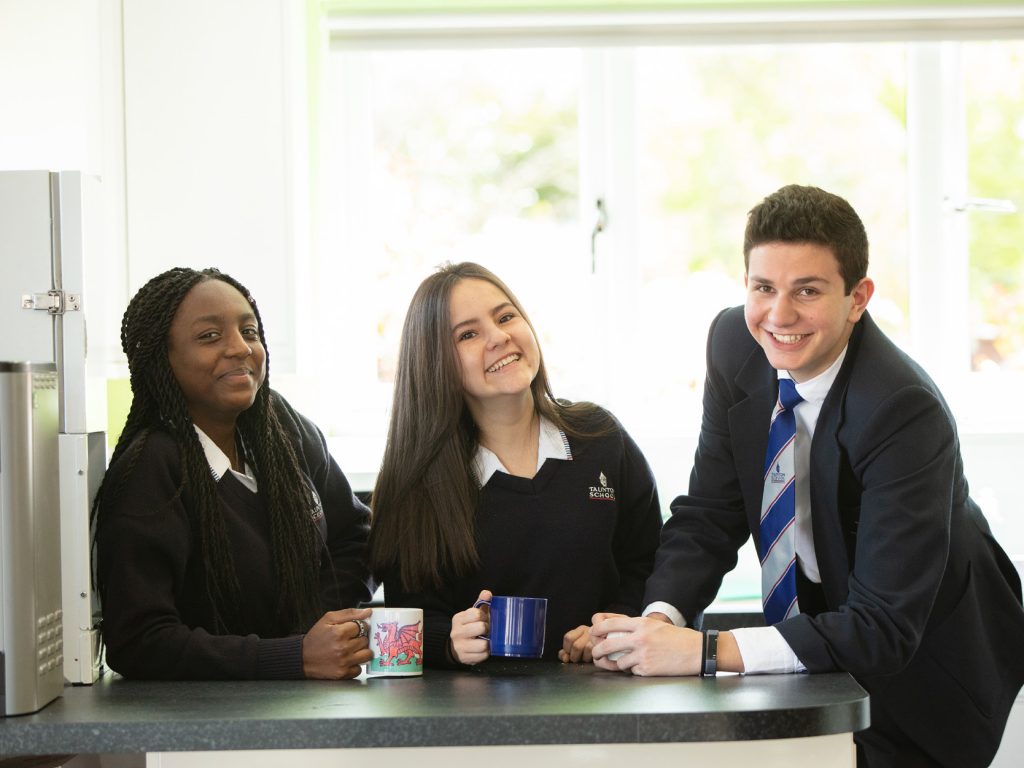Once you have completed your GCSEs, you typically have four options when progressing on your education journey: A-Levels, a Foundation course, BTECs and the International Baccalaureate. Each are suited to different students depending on their interests, goals and learning styles.
The International Baccalaureate is a globally recognised qualification, which offers students the opportunity to specialise in specific areas, whilst keeping their options open for further education. At the core of the IB course, students study six subjects.
Taunton School is the most experienced provider of the IB across Somerset, we provide our students with the very best IB opportunities.
Learn more about the IB at Taunton School >
In a nutshell, the IB allows you to study more subjects and allows an individual to garner additional skills which could be useful in the workplace. However, A-Levels offer greater flexibility with subject choices. Both guarantee a well-rounded and thorough education.
With both course options available at Taunton School, it can be hard to decide which course is best for you. Read our blog to find out more about each option; if you are still unsure, you can speak to our friendly Admissions team who will be able to help advise you.
What are A Levels?
In the UK, A-Levels are the most common post 16+ pathway for most students. Once you have completed your GCSEs, students pick three or four specialist subjects to study over the next two years.
The reason these qualifications are so popular is because they allow students to explore the subjects they really enjoy in more depth. Students taking A-Levels can study any combination of subjects, which means they can favour the subjects they enjoy more or perhaps feel more confident in.
For example, a student can choose to take subjects such as Literature, Art, Philosophy and History, without any requirement for Mathematics or Science.
This study is specialist and in-depth, offering students a greater understanding of the subject matter, and the chance to perhaps study it further at university.
Learn more about A-Levels at Taunton School >
How do the subjects differ between A-Levels and the IB?
In both IB and A-Level, students have the flexibility to choose their fields of study for the next two years. The IB offers a broader pathway with more subject, A-Levels offers greater flexibility and the chance to specialise.
IB students cannot study any combination. Instead, subjects are divided into specific groups, such as sciences, modern languages or humanities, and students must take one from each group. This is why the IB is better suited to students who are well-rounded and confident across the majority of subjects.
With IB, students tend to take three subjects at higher level, and three at standard level. A-Level students only take three, which would be equivalent to the higher level IB courses.
Learn more about your options with the IB >
Find out from one of our former students, Liam Travers, why the IB was right for him.
In terms of marks, the IB is graded from 1 (lowest) to 7 (highest) whilst A-Levels use the letter-grading system of A* to E. Both qualifications comprise of exams after a two-year course. In 2022, Taunton School students achieved a 100% IB pass-rate, exceeding the world-average by almost two full points!
What would your workload look like with the International Baccalaureate?
A-Levels are generally purely academic, subject-based qualifications. However, IB incorporates other aspects, such as theory of knowledge assignments, an extended essay (which sets students up perfectly for university!) and ‘creativity, activity, service’ assignments.
Taunton School’s IB coordinator, Adrian Roberts, said that students’ ‘willingness to aim high and extend themselves’ beyond a standard curriculum stands our students in good stead for future careers.
When studying the IB, it would be expected that students have more contact hours. Alongside prep and coursework, the breadth of study ensures you have lots of time in the classroom. A-Levels, on the other hand, advocate greater independent study and, therefore, students tend to have fewer contact hours.
What future opportunities do these qualifications offer?
Universities understand the unique strengths of both A-Levels and IB qualifications. One University Admission Officers Report (2017) stated that the IB offered a ‘global outlook’ and encouraged ‘greater independent inquiry’ in students. Meanwhile, 94% of admissions officers believe A-Levels prepare students for university courses due to their depth of information.
Our IB students have progressed onto a range of different universities, both in the UK and worldwide. In the UK, our students have attended Oxford University, Imperial College London and the University of St Andrew’s. Meanwhile, our students have also secured places internationally at the University of California, University of British Colombia and Maastricht.
The IB and A-Level both offer unique pathways for our students. Taunton School’s offering of both IB and A-Level allows our students to choose the academic route which is right for them. The flexibility of opportunities available allows our students to flourish in a field which supports both their academic development and their personal growth at school.
Talk to the Experts
Taunton School has a dedicated Careers Department which oversees careers and university advice for the whole school throughout the year.
Our Careers Department really comes into its own for senior school pupils. They work with individual students to lead them through the application processes for their chosen post sixth form pathway, using online platforms such as Unifrog from Year 11 onwards. Students can also attend specific information evenings for IB or A levels, where they can meet older students, as well as specific subject teachers and hear about the courses in more detail.
Attend an open event at Taunton School >
If you are approaching Sixth Form or college and you are unsure which pathway is right for you, the Careers Department also support younger students in recognising their talents, addressing areas for development and setting goals, whilst building their profile of transferrable skills to ensure a seamless transition to their post-16 pathway. In Year 11 students are offered the opportunity to use the online platform Morrisby and take the objective psychometric assessments, helping them identify their strengths.
Are you interested in studying the IB or A levels at Taunton School?
Speak to our team and explore the right pathway for you at Taunton.
Contact Our Admissions Team




